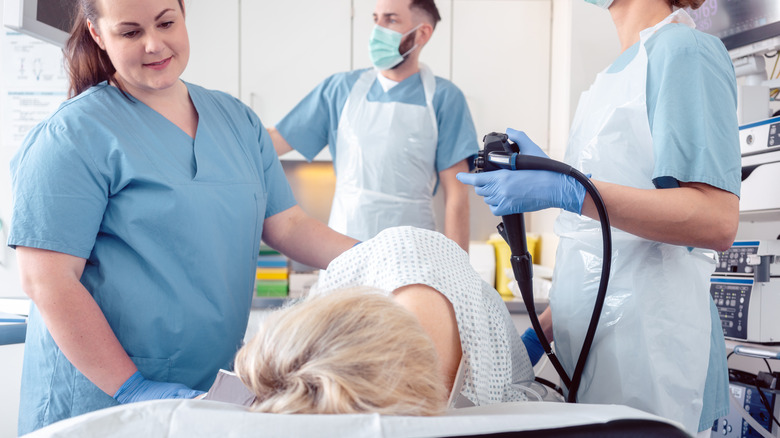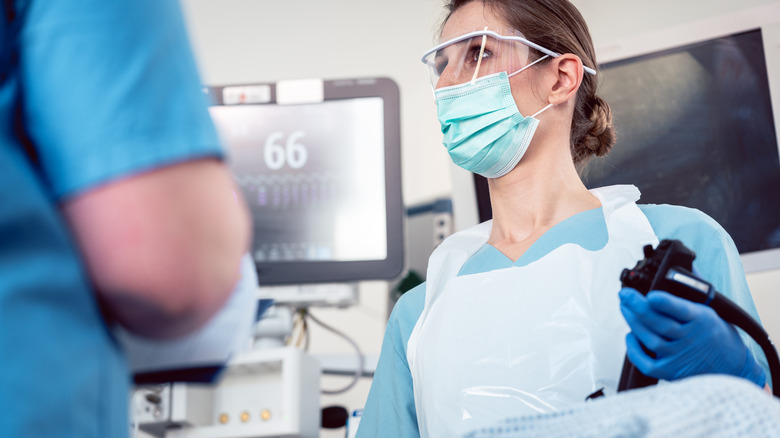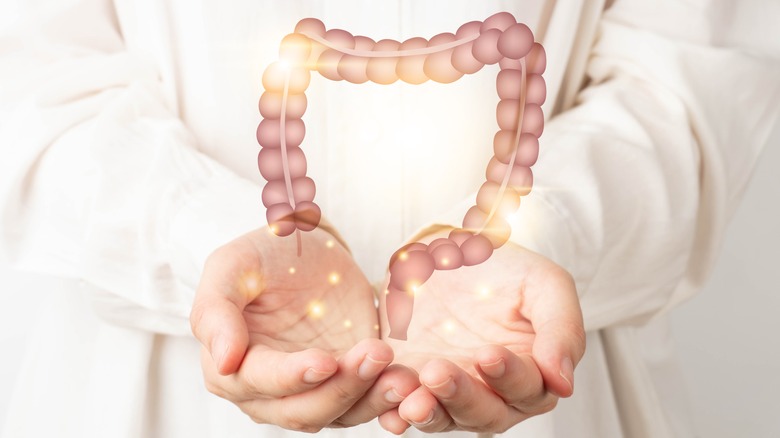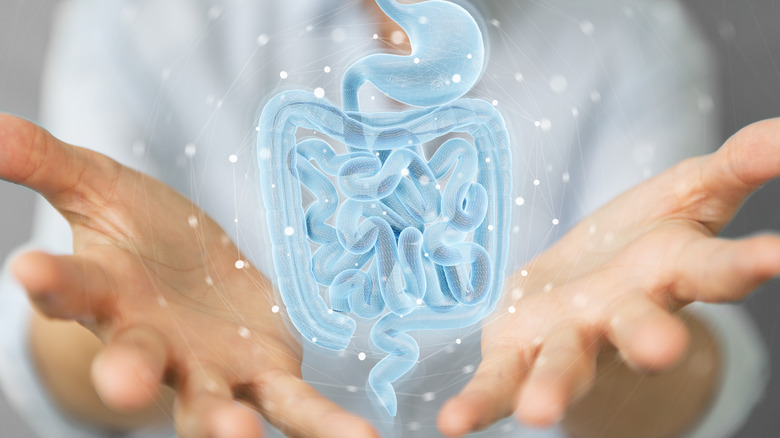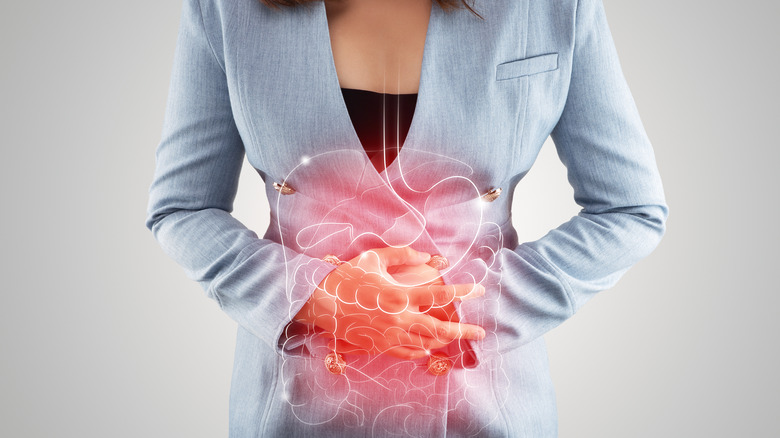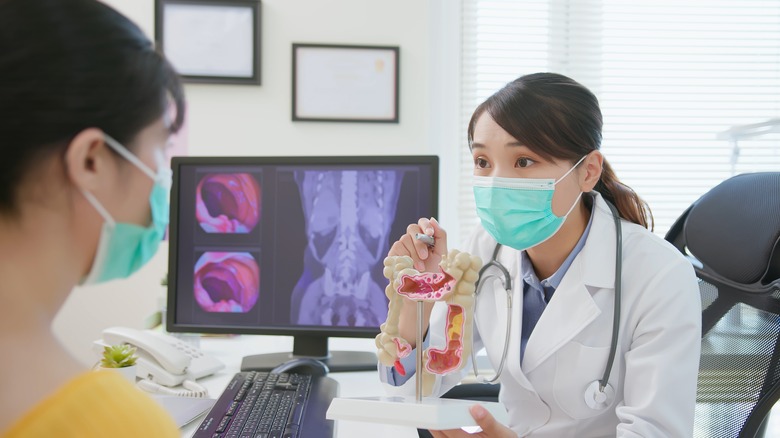Health Conditions A Colonoscopy Can Detect
A colonoscopy is an important medical procedure for preventing and detecting various conditions before they become severe. The colonoscopy procedure allows a healthcare provider uses a long, flexible tube called a colonoscope to examine the inside of the large intestine (via the Mayo Clinic). According to Healthline, the large intestine is about 5 feet in length and comprises the cecum, colon, rectum, and anus. It is responsible for absorbing water and electrolytes from indigestible food matter and forming and storing feces before excretion.
An average colonoscope is built to enter the colon and has a small camera at the end, which transmits images to a monitor, explains the Mayo Clinic. The colonoscopy procedure is typically recommended for people over the age of 45 or those with a family history of colon cancer. It should be done every 10 years or sooner, depending on your personal medical history. During the procedure, polyps or abnormal tissue may be removed.
What happens during a colonoscopy
According to the National Institute of Diabetes and Digestive and Kidney Diseases (NIDDK), a colonoscopy procedure is typically done in a hospital setting and takes around 30-60 minutes. It can be done on an outpatient basis, so patients do not need to stay too long in the hospital, per the American Cancer Society.
A colonoscopy requires adequate preparation. Before the procedure, patients will typically be asked to follow a specific diet and take a laxative to clean out the colon. This is done to ensure that the colon is as empty as possible, which makes it easier for the healthcare provider to see the inside of the colon.
During the procedure, patients are first given a sedative and pain medication to help them relax and become comfortable, according to the American Cancer Society. The colonoscope is then inserted through the anus before being advanced through the rectum and into the colon. The colonoscope inflates the large intestine to provide a clear view, per the NIDDK. If any abnormal growths are found in the monitor, the healthcare provider may take a biopsy or remove them.
Colon cancer
According to the Cleveland Clinic, colon cancer (or colorectal cancer) usually starts in the colon or rectum as a small, benign growth called a polyp. Over time, these polyps can develop into cancerous tumors. The exact cause of colon cancer is not fully understood, but certain risk factors have been identified, including age, genetics, and lifestyle factors, per the American Cancer Society.
A colonoscopy can help doctors detect signs of abnormal growths, such as polyps or tumors, which are linked to colorectal cancer (per the Mayo Clinic). If any suspicious anomolies are found, the doctor may remove a small piece of tissue for further examination (biopsy), according to the clinic. If cancer is found, the doctor will use the colonoscope to determine how far the cancer has spread. They will then use that information to decide on the appropriate treatment.
It is important to note that colonoscopy is not the only screening test for colorectal cancer. Other options include stool tests, CT colonography (virtual colonoscopy), and flexible sigmoidoscopy, explains the Cleveland Clinic.
Crohn's disease
Crohn's disease, which causes inflammation in the digestive tract, is categorized as an inflammatory bowel disease (IBD). According to the Mayo Clinic, the inflammation usually occurs toward the end of the small intestines and the colon, but it can occur anywhere in the digestive tract.
Symptoms of Crohn's disease can vary depending on the location and severity of the inflammation. Still, they can include abdominal pain, cramping, diarrhea, rectal bleeding, fatigue, and weight loss. The exact cause of Crohn's disease is unknown, but it is thought to be a combination of genetic and environmental factors. According to the Centers for Disease Control and Prevention, around 1.3% of American adults have been diagnosed with inflammatory bowel disease as of 2015, including Crohn's disease or ulcerative colitis.
A colonoscopy can diagnose and monitor Crohn's disease. During the colonoscopy, the doctor can see any inflammatory cells (known as granulomas), ulcers, or strictures (narrowing of the intestine) that are characteristic of Crohn's disease, explains Healthline.
Diverticulitis
Diverticulitis is a condition in which small pouches (diverticula) form in the colon wall and become inflamed or infected (via the Cleveland Clinic). The diverticula are formed when the colon's inner lining bulges through weak spots in the muscle wall of the colon. Diverticula are common and usually do not cause any problems; however, when these pouches become inflamed or infected, it results in diverticulitis. Diverticulitis can occur at any age, but it is most common in people over the age of 60. Other risk factors for diverticulitis include age, constipation, eating a low-fiber diet, obesity, and smoking.
Symptoms of diverticulitis can include abdominal pain — usually on the left side — constipation, diarrhea, bloating, gas, nausea, vomiting, and fever, per WebMD. A colonoscopy can be used to diagnose and monitor diverticulitis. Doctors will usually look for any signs of ulcers, sores, abnormal growths, or bleeding, which are characteristic of diverticulitis, according to the Cleveland Clinic.
The risks of a colonoscopy
A colonoscopy is generally a safe procedure, but like any medical procedure, it does come with some risks. For example, there is a small risk that the colonoscope can accidentally puncture the colon or rectum's wall, says Healthline. The procedure may cause slight bleeding at the site of any biopsies or polyp removals, says WebMD.
Any prolonged bleeding should be reported to your healthcare provider as soon as possible. Some people may have an allergic reaction to the sedative used during the procedure. The patient should report any previous allergic reactions to a doctor before the procedure. If unclean tools are used, there is also a small risk of infection caused by E. coli, Klebsiella, or Enterobacter, according to WebMD.
Generally speaking, it's important to discuss the risks and benefits of the colonoscopy with your doctor, as well as any other screening alternatives that may be available. They will recommend the best test for you, considering your individual situation and risk factors.

